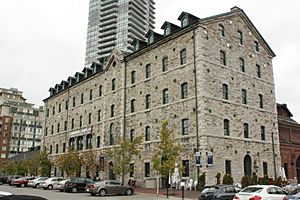Stone Distillery facts for kids
The Stone Distillery is a very old and important building in Toronto, Ontario, Canada. It was built in 1859 and is a big part of the Distillery District. This building is the oldest and largest one in the area, which used to be home to the Gooderham & Worts Distillery.
Contents
Building Design and Size
The Stone Distillery was designed by David Roberts, Sr. It was built between 1858 and 1861. The builders used strong limestone from Kingston, Ontario and special double-timber beams. The whole project cost about $150,000 back then, which would be like $3,800,000 today.
The building was made to hold a grist mill (where grain is ground), a power house, and areas for mashing and distilling. The main part of the building has five floors. There was also a one-story section on the west side for fermenting.
Victorian Architecture Style
The Stone Distillery is very noticeable in the Distillery District because it's so big and made of strong materials. It is 300 feet long and 80 feet wide. It's a great example of Victorian architecture, which was popular during the time Queen Victoria ruled. It also looks a bit like old buildings from Florence, Italy.
Each floor in the main building has a line of stone separating it from the next. The first floor is larger, and the square windows make the building look very solid. The outside of the building is simple but has a nice pattern of windows. Round iron plates connect the building's parts. The building has a simple color scheme: warm grey limestone with dark green on the windows and doors.
History of the Distillery
In 1869, something unexpected happened. An explosion in the fermenting cellar caused a huge fire. The fire destroyed the wooden parts inside the building, but the stone walls and machinery were mostly okay. The building was fixed up and opened again in May 1870.
Role in World Wars
During World War I and World War II, the distillery helped with the war effort. Instead of making drinks, it produced special materials used in explosives. After the wars ended in 1945, it went back to making drinks until 1990.
From Distillery to "Hollywood North"
For the next ten years, the Stone Distillery didn't make drinks anymore. Instead, it became a popular place for filming movies! Hundreds of movies were filmed there, including famous ones like Chicago and X-Men. This helped Toronto get the nickname "Hollywood North."
Modern Use of the Building
In 2001, a big project started to make the Distillery District new again. By 2003, it opened as a special area just for people walking. It became a center for arts and culture. Today, the Stone Distillery building is home to many different things, like restaurants, art galleries, offices, and other services.
See also
 | May Edward Chinn |
 | Rebecca Cole |
 | Alexa Canady |
 | Dorothy Lavinia Brown |


